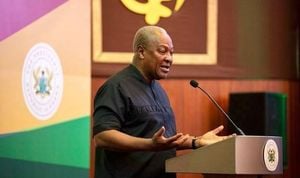On October 10, 2025, a quiet suburban street in Hoffman Estates, Illinois, erupted into chaos as a viral video captured the violent arrest of 18-year-old Evelyn by law enforcement officers. The footage, which circulated widely on social media platforms throughout the weekend, showed unmarked vehicles converging on a driveway, officers pulling Evelyn from her car, and one officer appearing to restrain her with a knee on her neck as she loudly pleaded, “I’m not resisting!” The scene, reminiscent of past controversies over police use of force, reignited fierce debate over the Trump administration’s approach to immigration enforcement and the deployment of federal forces in American cities.
According to CBS News, Evelyn and her friends had been monitoring Immigration and Customs Enforcement (ICE) activity in the area when the incident unfolded. Her parents later told reporters that after the arrest, Evelyn and her friends were taken in unmarked cars to the Hoffman Estates Police Department parking lot, where they were held for hours before being released without charges. The arrest, and the confusion surrounding which agency was responsible, quickly became a flashpoint in the ongoing national conversation about accountability and transparency in federal law enforcement.
The Department of Homeland Security (DHS) responded swiftly but controversially. On October 12, 2025, Assistant Secretary Tricia McLaughlin attempted to downplay the incident on X (formerly Twitter), claiming, “Imagine being so desperate to demonize law enforcement you post a video from a burglary arrest Chicago Police made over a year ago. This isn’t even ICE.” McLaughlin’s statement referred to a 2024 arrest of a 15-year-old girl in Chicago, charged with robbery. However, as Block Club Chicago and CBS News would soon clarify, the location of the viral video was in fact Hoffman Estates, a suburb an hour away from the site of the 2024 incident. The Chicago Police Department also confirmed that the 2024 arrest occurred on the 1200 block of West 109th Street—nowhere near the suburban location seen in the new video.
By October 14, CBS News had confirmed that the video showed the recent arrest of Evelyn, a U.S. citizen, and not a minor as initially speculated by some online accounts. Contrary to early reports, Evelyn had not claimed to be underage during her arrest, but rather protested, “I’m not resisting!” as she was restrained. The Hoffman Estates Police Department later released a statement acknowledging that ICE agents were present in their parking lot on the day of the arrest and that two ICE agents had entered the police station to file a report about an incident in the village. However, the exact role ICE played in the arrest remained unclear, fueling further questions about coordination—and accountability—between local law enforcement and federal immigration authorities.
Illinois Representative Raja Krishnamoorthi, a frequent critic of President Trump’s immigration policies, condemned the arrest in a sharply worded statement. “The events in Hoffman Estates embody everything that’s wrong with the Trump Administration’s militarized ICE raids: cruelty without accountability, secrecy without oversight, and power without restraint,” he said, according to CBS News. Krishnamoorthi’s remarks echoed growing concerns among civil rights advocates and local officials about the expanding role of federal law enforcement in domestic policing, particularly under the auspices of President Trump’s “Operation Midway Blitz.”
The operation, which began earlier in 2025, has seen federal forces deployed in Chicago and other major cities, purportedly to combat violent crime and enforce immigration laws. Yet, as reported by CBS News and independent journalist Jacqueline Sweet, the results have been mired in controversy. Just last week, an attorney representing a Chicago resident told a judge that Border Patrol agents had rammed into his client’s car—contradicting federal claims that the client had instigated the collision. The attorney further alleged that an agent had taunted his client before shooting him five times, a claim DHS denied, insisting the officer acted in self-defense.
In another incident last month, DHS asserted that ICE agents had shot and killed “a criminal illegal alien with a history of reckless driving” during an attempted detention. However, a subsequent investigation revealed that the man had no criminal history, with his last traffic violation dating back to 2013. These revelations, coupled with the department’s misstatements about Evelyn’s arrest, have led critics to accuse DHS of repeatedly misleading the public about the nature and necessity of its enforcement actions.
The controversy in Hoffman Estates also comes amid heightened tensions in Portland, Oregon, where President Trump’s efforts to deploy National Guard troops from California have been met with legal resistance and public skepticism. On October 14, 2025, White House Press Secretary Karoline Leavitt defended the President’s actions in a heated exchange with CNN reporter Kaitlan Collins. Leavitt insisted that “the President is using his authority as commander in chief, US Code 12406, which clearly states that the President has the right to call up the National Guard in cases where he deems it’s appropriate.” She cited ongoing unrest at the Portland ICE facility, claiming, “for more than 100 days, night after night after night, the ICE facility has been really under siege by these anarchists outside.”
Collins, however, pushed back, referencing a recent conversation with the Portland police chief who disputed the administration’s depiction of events on the ground. Local officials told CBS News that only a handful of nonviolent protesters had been present during the day, and approximately 100 peaceful demonstrators gathered at night—hardly the “anarchy” described by Leavitt. The protests, they noted, were aimed at opposing ICE’s ongoing raids on immigrant communities, not at fomenting violence or chaos.
The legal backdrop to these confrontations is equally complex. While an Oregon judge recently ruled against Trump’s attempt to send federalized National Guard troops from Oregon, a Los Angeles judge found that the President was within his authority to deploy troops, prompting the administration to appeal the Oregon ruling. The conflicting court decisions have only added to the confusion and political rancor surrounding federal intervention in local affairs.
Social media users have not been shy in voicing their opinions. One X user wrote, “Trump is breaking the law! In Trump’s attempt to score points from his supporters by authorizing the National Guard to police ‘blue cities’ (his words). If Trump cared about crime, he would have discussed crime as happening everywhere.” Another user challenged Leavitt’s legal justification, arguing, “The law she cites doesn’t say the President can call up the National Guard ‘in cases where he deems it appropriate,’ it says he can do it in specific circumstances such as foreign invasion.” Matt Wylie, another X user, summed up the constitutional concerns: “The Constitution is clear: The military exists to defend the republic from foreign threats, not to be wielded as a political weapon at home. To even hint otherwise is reckless, unconstitutional and corrosive to the fabric of a free nation.”
The events of the past week have underscored the deep divisions—and the high stakes—at play as federal, state, and local authorities grapple with questions of law, order, and civil liberties. With public trust in government institutions already strained, the need for transparency, accountability, and honest communication has rarely been more urgent.




